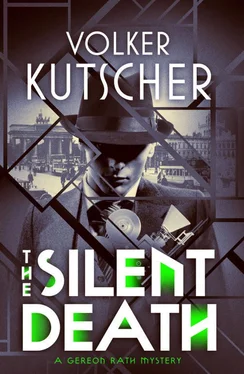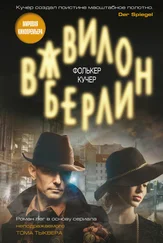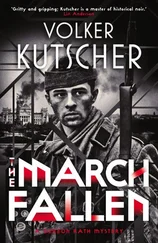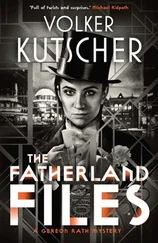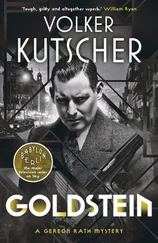Karl. Police Director Engelbert Rath spent more time telephoning Berlin Police Commissioner Karl Zörgiebel, whom he knew from Cologne days, than he did his own son.
‘Dörrzwiebel’s back from Mainz?’ Gereon said. ‘There’s been absolutely no sign of him here at the Castle.’
‘Stop using that unspeakable nickname.’
The commissioner was known as ‘Dörrzwiebel’ on account of his dessicated onion-like complexion.
‘As far as I know the Communists have simply called on workers to strike, and Zörgiebel’s forbidden it again. He doesn’t seem to have learned anything from last year.’
The police had upheld Zörgiebel’s May demonstration ban at the cost of more than thirty fatalities.
‘Karl knows what he’s doing, you have to act quickly against the Communists.’
‘It isn’t our job.’
‘Let’s put politics to one side,’ Engelbert Rath said. ‘I don’t want to fight with you. How are things going otherwise? Made any progress?’
‘Pardon me?’
‘Any leads? Have you taken a look at the factory?’
‘I’ve had too much on my plate, and there’s not much I can do without a list of names.’
‘That should have arrived long ago, together with our card.’
‘I’ll take a look in the mailbox.’
Engelbert Rath cleared his throat. ‘Gereon, I’m not sure you’re taking this assignment seriously enough. If you want to make chief inspector you have to work for it. Something like that doesn’t get handed to you on a plate.’
‘You should know.’
‘And so should you! This isn’t just about a promotion. The mayor is trusting us to help him out of a tricky situation. If you betray that trust, you’ll be dragging the good name of Rath through the mud.’
‘But your name above all.’
‘Start taking this more seriously and see that it’s done.’
‘Aye aye, Sir!’
Rath hung up. His father was right, but he didn’t have to admit it just yet. He reached for his hat and coat and said goodbye to Erika Voss. There was nothing more he could do in the office anyway.
Westhafen was more or less on the way to Reinickendorf, meaning Rath could kill two birds with one stone. A metal sign on the brick façade announced that the Ford Motor Company manufactured their automobiles in a warehouse on the quayside. He parked the Buick out front by the admin building since he didn’t want to roll up in a rival product.
Large, wooden crates were being loaded by crane and stacked next to the shop, at the other end of which dozens of spotless Ford A models were lined up, all of them painted red-black. Bruno, his first boss here in Berlin, had driven one just like it. A few men were hanging around outside the shop, turning eagerly as an iron door opened and a man in grey workers’ overalls appeared on the loading platform.
‘We could use two auto locksmiths for the next shift!’ he shouted.
Four men peeled away from the group and stood next to Rath, who was already on the platform steps.
The foreman made his choice. Paying no attention to a man in a suit waving his engineering diploma, he instead gestured towards a powerfully built worker in a boiler suit and a small, nimble-looking man in a thin jacket. ‘You,’ he said. ‘And you.’
The pair climbed the steps, while the other two returned to the group of unemployed. Rath followed them up the stairs.
‘I’m sorry,’ the foreman said, ‘but we only need two.’
The two workers eyed Rath suspiciously. He flashed his badge. ‘CID,’ he said. ‘I need to have a look around your plant.’
‘What’s this about?’ the foreman asked, but before Rath could answer he shouted at the two unemployed men. ‘Are you here to work or stare? Go inside and report to Section D. You’ll be briefed there.’
The smaller man opened his mouth but his partner pulled him through the door before he could speak. Probably for the best, if they didn’t want to lose the work, Rath thought.
‘So,’ the foreman said, ‘what’s this all about?’
‘I can’t tell you anything about the background to the investigation, but I can assure you that I will respect any trade secrets. You can tell me as much as you would any journalist.’
‘It’s only management that speaks with journalists.’
‘I’m certain that you can help me, Herr…’
‘Bahlke, shift supervisor.’
‘Then, Herr Bahlke, let me have a quick look around. Explain to me roughly how everything works, and I’ll be on my way. Five minutes.’
Bahlke yielded. ‘Come with me,’ he said. ‘But there isn’t much to see.’
There was a hellish din in the shop. ‘It’s best if we go up here,’ Bahlke shouted over the noise, and pointed towards a steel staircase. The stairs led up to a room with an overview of the shop. ‘The shift supervisor’s office,’ Bahlke said. ‘You get a view of everything from up here. You need it too.’
Rath gazed beneath him. A caravan of half-finished vehicles moved at a snail’s pace through the shop and workers were everywhere assembling parts. At each station the frame of the car grew: steering, seats, wheels, and finally the engine and body, which arrived from above, floating down into the chassis to make the finished product, a Ford Model A.
‘Sixty cars a day,’ Bahlke said proudly. ‘Individual parts come from overseas and we assemble them here, using the American conveyor belt system.’ He pointed to a station along the line where a red-haired man was showing the two new recruits how to fit the engines. The bodies were already approaching from above. ‘You see the site of the marriage? Section D is where the body is fitted to the chassis, just after the engine has been installed.’
The red-haired man looked up at precisely the moment Bahlke pointed at him. Even from here Rath could see the worker grow wide-eyed and set to work with renewed vigour. Standing up here was like being in a display case on the Ku’damm. Every worker could see them through the great glass window, and they all realised they were being watched. It kept the workers on the go, along with the relentless march of the conveyor belt.
‘Impressive,’ Rath said. ‘What happens if someone needs the toilet?’
‘Then he works his way forward. For longer breaks, he organises a stand-in, which is deducted from his wage. You only get paid for the work you do.’
‘Do you always recruit your workers like that?’
Bahlke shook his head. ‘Most of them applied the usual way, but there are more and more awaiting their chance outside. We pay well, and the more work you do, the more you make. No one pays as well as Ford. No sign of the financial crisis here. I’m telling you: in five years’ time the Berlin Ford plant will be as big as Siemens!’
This man has no idea what’s coming, Rath thought. The blackmailer was not only well informed about the state of Adenauer’s finances; he also had exclusive knowledge of Ford’s move to the Rhine. Knowledge is power. Rath couldn’t help thinking of his father’s motto. It sounded like an instruction manual for blackmailers. ‘Who’s to say you’re not picking up criminals when you take men straight from the streets without papers?’
‘I see how they work first. If I’m satisfied, they take their papers to Personnel. Why do you ask? You’re not looking for criminals here, are you, just because the prison’s around the corner?’
‘Don’t worry, I’m not looking for anyone who’s escaped from Plötzensee. I’m interested in any possible link between your workers and Deutsche Bank. Who might have a connection?’
‘There are almost three hundred people working here. How am I supposed to know that? Your best bet would be the people in the wages office, not the workers here.’
Читать дальше
